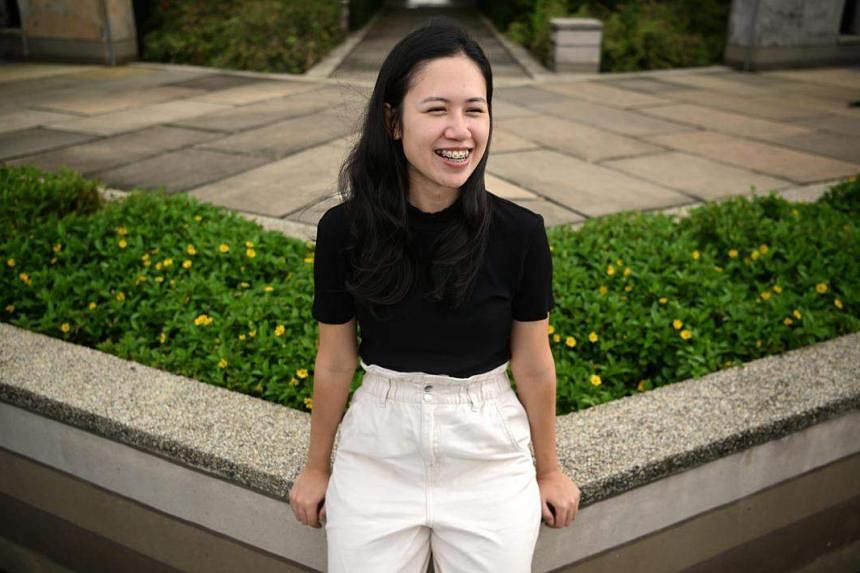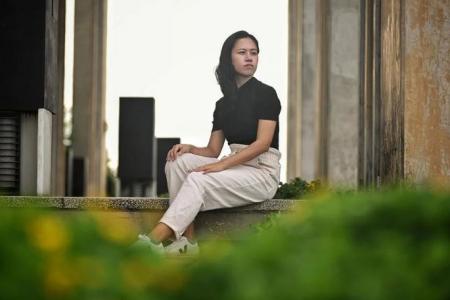She thought she was done with long Covid, but it returned
When Ms Sara Ann Nicholas contracted Covid-19 in February, the 24-year-old thought she would be back on her feet in a couple of weeks. However, she is still on the long road to recovery.
In June, the researcher in cities and urban planning thought she was cured of post-Covid symptoms such as fatigue and chest pains. She was back to doing high-intensity workouts and planning a holiday overseas. But her condition worsened by August. As of November, she could barely walk 1,000 steps a day without exhausting herself.
Ms Nicholas has long Covid, a condition in which symptoms such as fatigue and breathlessness develop and linger for months. “It’s just so difficult when what I’m used to is going for runs, long walks and hiking,” she says. “You can’t help but be envious of the life you had and seeing other people go on with their lives.”
She received three vaccination shots before contracting Covid-19.
She adds: “I have to explain to my friends that sometimes, I can walk for a bit and have to sit down. Sometimes, I can meet them for dinner for only two hours, and then I go straight home. I can’t stay on for dessert, drinks, or anything like that.”
In October, the World Health Organisation (WHO) called on the authorities around the world to invest more resources into raising awareness of long Covid and supporting sufferers.
According to WHO, 10 to 20 per cent of people who contract Covid-19 can develop long Covid, regardless of age, fitness level, or viral variant contracted.
Long Covid can affect a person’s ability to work and fully participate in society. With the effects lasting up to a year in some cases, it can also have a negative impact on mental health.
Singapore does not officially count the number of long Covid sufferers here, but doctors that The Straits Times spoke to say they have been seeing a steady number of patients with post-Covid symptoms that linger for months.
Dr Calista Chong, family physician at Redwood @ TPY Clinic and Surgery in Toa Payoh, has seen between 50 and 75 such patients this year.
She says most of them have a persistent cough and their underlying health conditions have worsened. “Patients with eczema will get a flare-up with skin rashes and itch. Patients with gastric issues will present with indigestion symptoms. Patients with underlying chronic health disease may present with fatigue, sometimes shortness of breath with exertion.”
The condition affects her patients’ lives significantly, she adds. Some are teachers with a persistent cough, who come to her every fortnight for medication to suppress it. “They also worry if they are still infectious and allowed to work. It affects their mood and they sometimes fear they will not get better.”
Dr Grace Huang at DTAP Clinic sees between five and 10 patients a week with post-Covid-19 issues such as fatigue and breathlessness, but many do not return. “If we assume that patients did not return because their symptoms resolved, then patients with long Covid could be in the minority,” she says.

From the first quarter of 2022, public and private hospitals in Singapore started long Covid clinics that specialise in rehabilitation services for such patients. Doctors at long Covid clinics offer a wide range of support for patients, including talking to employers about why their employees cannot function as they used to.
Dr Lim Jeong Hoon, senior consultant at National University Hospital’s (NUH's) division of rehabilitation medicine, department of medicine, runs long Covid clinics at NUH and Ng Teng Fong General Hospital. He has seen 250 patients since February.
His clinics refer patients to occupational therapy, so they can redesign their lives, and physiotherapy, to rebuild strength and functioning. Patients also receive treatment for symptoms or referrals to relevant specialists.
The clinics also explain long Covid to employers and suggest modifications that can allow patients to continue working.
Dr Lim says about 60 per cent of long Covid patients recover within a year. “Though long Covid may not entail permanent disability, some symptoms such as brain fog and fatigue can incapacitate a patient and affect work performance for some time. Instead of concealing or under-rating the condition, it would be better for the patient to inform the workplace and seek medical advice. The long Covid clinics have been communicating with employers to seek their understanding and arrange necessary job scope modifications.”
Tested positive for Covid-19? Don’t rush back to work or exercise
Long Covid-19 disables millions worldwide, even as rates ease, study shows
Yet, patients are hesitant to talk about their condition, in case they are accused of malingering. Ms Anne Soh, who organises arts and culture events for a non-profit organisation, says that when she tries to explain her condition, some people think she is making it up.
The 51-year-old, who has fatigue and breathlessness, contracted Covid-19 in February after being vaccinated. She thought she had regained 80 per cent of her energy in August, but then the fatigue worsened.
To manage this, she now stops whatever she is doing and takes a break as soon as she detects early signs of fatigue. “This way, I’ve been able to avoid being forced to rest for extended periods of two to three days before regaining strength.”
She started a private long Covid support group with 11 members, who share strategies and resources to manage the condition. Some of them struggle with depression, she says, resulting from their lack of ability to function at pre-Covid-19 levels.
While resting and not fatiguing themselves are important for people with long Covid, medical experts say it is also important to resume activity and suitable exercise programmes.
Cardiologist Edgar Tay from Asian Heart & Vascular Centre at Mount Elizabeth Hospital has seen about one patient a week for post-Covid-19 symptoms. His clinic offers a post-Covid-19 medical evaluation with private clinic Respiratory Medical Associates at Mount Elizabeth Novena Hospital.
One of his patients, a middle-aged woman, was unable to sleep or work because of persistent coughing, breathlessness and chest pain. Her symptoms had to be tackled by a cardiologist, a respiratory physician and a neurologist. Following that, she started a low-intensity exercise programme, which has helped her symptoms improve and enabled her to return to work.
Many long Covid patients appear to benefit from such structured exercise programmes, Dr Tay says.
Tan Tock Seng Hospital and local start-up Taggle Health are developing an app for such structured exercise programmes for people with long Covid. Called MoveVid, it is expected to be available in the first quarter of 2023, after the completion of an ongoing pilot study that aims to recruit at least 10 patients.
askST: Can vaccination reduce symptoms of long Covid-19?
App to help those with persistent Covid-19 symptoms recover through exercise
Awareness of long Covid and support for sufferers are growing, albeit somewhat late for people like Ms Nicholas.
She went to the accident and emergency (A&E) department three times in 2022 – in March, July and October – when symptoms such as chest pains and breathlessness became too difficult to bear. In July, she asked an A&E physician about help for long Covid, but the doctor did not know where to direct her.
When she went to a polyclinic for a referral to a cardiologist, the doctor there told her “there’s no such thing as long Covid”, she recalls.
“He said: ‘You’re probably just having a panic attack.’ And I was just like: ‘I know how a panic attack feels, and this is not it.’”
Ms Nicholas lives with her parents, who are in their 60s. Her mother, who is retired, also contracted Covid-19 in February, but did not develop long Covid. Her father works in healthcare.
Through word of mouth, she finally found a long Covid clinic in a public hospital in end-August. It was a watershed moment, meeting a medical specialist who understood what she was going through and could offer some help.
“He said to me: ‘I think you’re finally at the right place.’ It just took a weight off my shoulders, even though I knew I was still ill.”
In her efforts to manage the symptoms, Ms Nicholas has given up caffeine, alcohol and socialising with friends as much as she used to. She cancelled her planned holiday in South Korea because she was worried about how the cold and physical exertion would affect her.
She says: “I’m keeping positive and reminding myself that I don’t have to be in a hurry to experience the world. Travel and socialising will be waiting for me once I’m ready, in my own time and at my own pace.”
Get The New Paper on your phone with the free TNP app. Download from the Apple App Store or Google Play Store now


